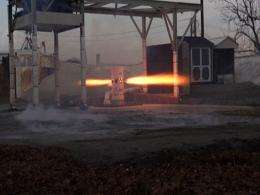Orion Launch Abort System Attitude Control Motor Lights Up Sky

(PhysOrg.com) -- It looked like a light show in Elkton, Md., on Tuesday, Dec. 15, as NASA ground tested a full-scale attitude control motor, or ACM. The motor operated with precision as its elaborate eight-valve control system opened and closed each valve at exactly the right moment with alternating bursts of light.
NASA's Marshall Space Flight Center in Huntsville, Ala. is responsible for overseeing the development of the ACM, one of three motors that make up the Orion crew exploration vehicle's launch abort system, or LAS -- a system that would pull the Orion crew to safety if needed. NASA and the contactor team Alliant Techsystems (ATK) located near Promontory, Utah, and Lockheed Martin Corporation of Denver performed the test at ATK's test facility in Maryland. This was the sixth in a series of ground tests of Orion's attitude control motor system, which is charged with keeping the crew module on a controlled flight path after it jettisons, steering it away from the Ares I rocket in the event of an emergency.
"The ACM is the most complicated solid rocket motor NASA has developed for human spaceflight in more than 30 years and this motor represents a quantum leap in technology for our application and thrust class," said deputy LAS manager Steve Gaddis of the Marshall Center. "This team has worked hard and I congratulate each one of them for their hard work, dedication and perseverance."
Having reached this milestone brings Constellation another step closer to flight-ready status and demonstrates progress toward improved flight safety for astronauts, which is at the core of Constellation Program success.
The launch abort system, mounted on top of the Orion crew module, centers around three solid propellant rocket motors: an abort motor, an attitude control motor; and a jettison motor. Successful tests of both the abort and jettison motors were completed in 2008. The attitude control motor consists of a solid propellant gas generator, with eight proportional valves equally spaced around the outside of the 32-inch diameter motor. Together, the valves can exert up to 7,000 pounds of steering force to the vehicle in any direction upon command from the crew module.
"Controllable solid rockets have only recently begun seeing application in spacecraft, and the ACM delivers an order of magnitude greater thrust than any of those systems," said LAS Manager Kevin Rivers of NASA's Langley Research Center in Hampton, Va. "It represents a significant advancement in the state of the art for controllable solid propulsion."
Testing wouldn't be possible without the support and hard work from the ATK, Lockheed Martin and NASA LAS teams.
"There are many dedicated people from across the nation who have worked diligently to overcome technical challenges to make the test happen," said Rivers. "I am proud of each of them."
The entire launch abort system will be demonstrated during a Pad Abort 1 flight test at the U.S. Army's White Sands Missile Range (WSMR) in New Mexico in the spring of 2010. This test will be the first full-scale test flight of the new system, simulating an emergency abort scenario using a full stack of Orion and the launch abort system.
The attitude control motor for the flight test is scheduled to be delivered to WSMR in January, followed by the stacking of the launch abort system.
Provided by JPL/NASA


















